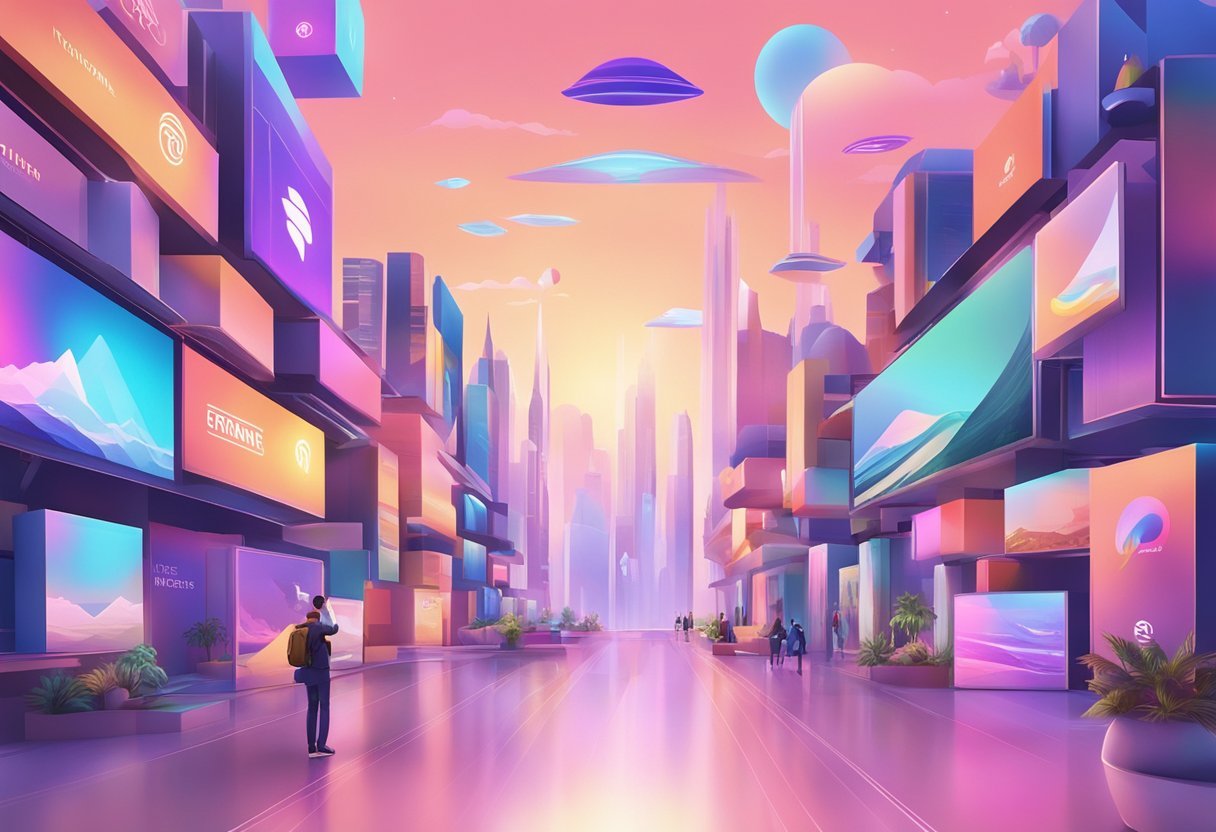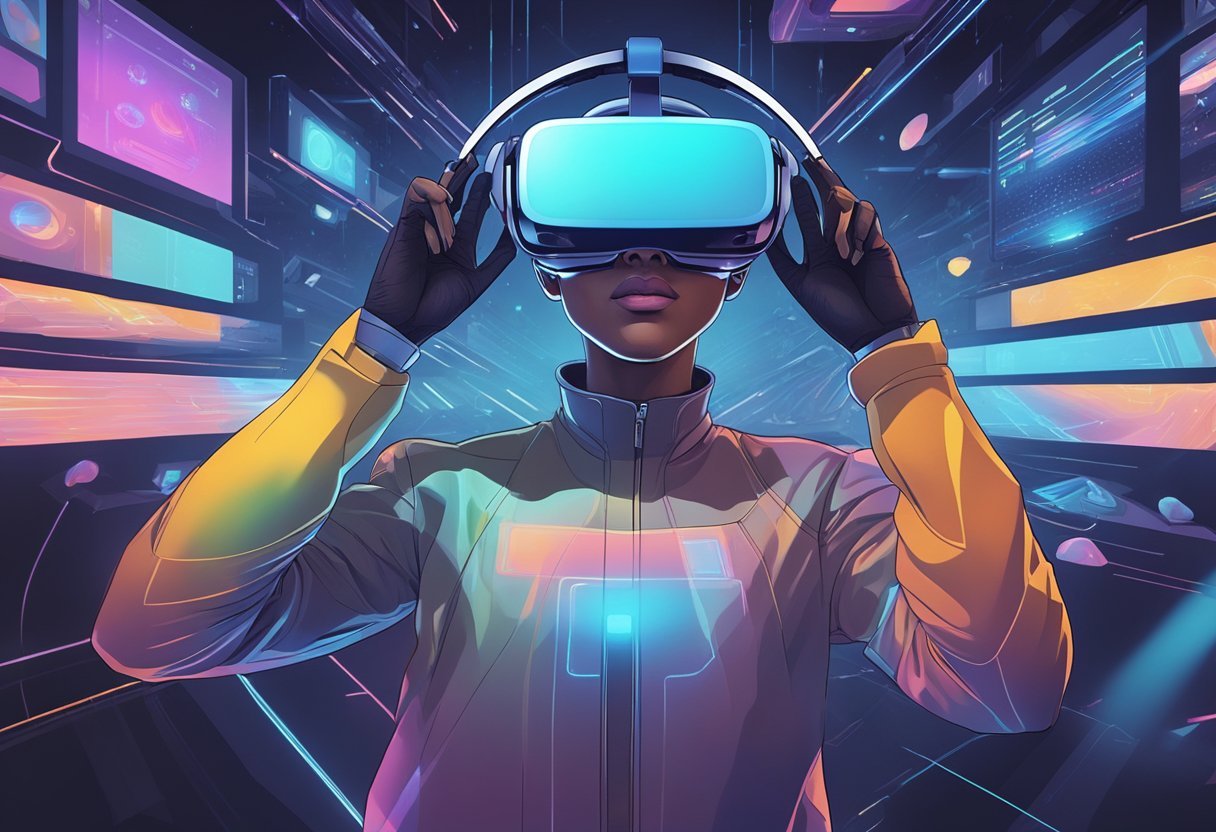The metaverse is a term used to describe a virtual world that is created by the convergence of physical and virtual reality. The concept has been around for decades, but it is only in recent years that it has started to become a reality. With the rise of virtual reality, augmented reality, and artificial intelligence, the metaverse is poised to become the next big thing in technology. In this blog post, we will look at the top metaverse companies and what they are working on to make the metaverse a better place
There are already hundreds of companies working on developing the metaverse, each with their own unique approach and vision. These companies range from small startups to large tech giants, and they are all working towards the same goal of creating a fully immersive virtual world. Some of the top metaverse companies include The Sandbox, Unity, and Fusion92, each of which brings their own expertise and innovation to the table. As the metaverse continues to evolve, it is clear that these companies will play a major role in shaping its future.
What Are Companies Doing in the Metaverse?
As the metaverse continues to gain popularity, companies are looking for ways to leverage this technology to enhance their businesses and provide new experiences for consumers. Here are the 20 top metaverse companies and what they are working on:
Meta (Facebook)
Meta (formerly Facebook) is heavily investing in the metaverse with its Oculus VR hardware and platforms like Horizon Worlds and Horizon Workrooms. Meta aims to create a set of interconnected virtual spaces for social interaction, gaming, work, and more. They are also developing AR technologies and have rebranded to signify their commitment to this new digital frontier.
Microsoft
Microsoft is focusing on the enterprise side of the metaverse with Mesh for Microsoft Teams, which integrates mixed reality into daily work. They also own Minecraft, a game that offers metaverse-like experiences. Microsoft is developing Azure Digital Twins to create virtual representations of real-world environments and objects for various industries.
Nvidia
Nvidia is contributing to the metaverse through its Omniverse platform, which is designed for creators to build and operate shared virtual spaces. It leverages Nvidia’s GPU technology and focuses on real-time simulation and collaboration across various industries, including film, video games, and architecture.
Roblox
Roblox is a platform where users can create and play games made by other users. It acts as a metaverse where millions of players interact, play, and create experiences in a shared online space. Roblox’s vision for the metaverse is a user-generated content ecosystem with a robust virtual economy.
Unity Software
Unity Software provides the engine that powers many of the world’s games and interactive 3D experiences, making it a foundational technology for the metaverse. Unity is also expanding its services to support the creation of metaverse applications with real-time 3D development capabilities.
Tencent
Tencent, one of the largest tech companies in China, is investing in various aspects of the metaverse, including gaming, social media, and infrastructure. They hold stakes in many gaming companies and are poised to leverage their vast user base and technological resources to shape their version of the metaverse.
Epic Games
Epic Games, the creator of Fortnite, is building towards the metaverse by transforming Fortnite into a platform for virtual events like concerts and movie trailers. They also develop Unreal Engine, which is widely used for creating 3D content for games and virtual worlds.
Sony Interactive Entertainment
Sony Interactive Entertainment, known for its PlayStation gaming consoles, is investing in the metaverse through VR with its PlayStation VR hardware. They are also involved in developing and publishing games that offer metaverse-like experiences, with a focus on immersive and interactive entertainment.
Samsung
Samsung is exploring the metaverse by integrating its technology with VR and AR experiences. They are developing hardware like VR headsets and have been involved in various partnerships to create virtual experiences and showcases for their products.
Apple
Apple is rumored to be working on AR and VR technologies, with speculation around a mixed reality headset and AR glasses. While not officially confirmed, Apple’s interest in augmented reality is evident through ARKit and the experiences enabled on their devices.
HTC
HTC, once known for smartphones, is now a significant player in VR with its Vive headsets. They are focusing on the metaverse by providing hardware for immersive experiences and developing platforms like Viveport, which offers a wide range of VR content.
Valve
Valve, the company behind the Steam gaming platform, has entered the VR space with the Valve Index headset. They are supporting the metaverse indirectly by providing a platform for VR games and experiences, and through their game development, which includes VR titles.
Decentraland
Decentraland is a decentralized virtual world powered by the Ethereum blockchain. Users can buy, sell, or develop land and participate in the virtual economy. It is an open-source initiative that emphasizes user ownership and governance of the digital space.
The Sandbox
The Sandbox is a blockchain-based virtual world where users can create, build, own, and monetize their gaming experiences using SAND, the platform’s cryptocurrency. It empowers creators through user-generated content and a “play-to-earn” model.
Autodesk
Autodesk offers design software that is essential for creating 3D models and environments in the metaverse. While not directly creating a metaverse, Autodesk’s tools are used by creators to build the virtual spaces that make up these digital worlds.
Adobe
Adobe is contributing to the metaverse through its Creative Cloud suite, providing tools for digital content creation. Adobe Substance 3D, for example, is used to create textures and materials for 3D models, an essential component of immersive virtual environments.
Qualcomm
Qualcomm is developing the underlying technology for the metaverse with its Snapdragon chips, which power many smartphones and VR/AR devices. They are focused on creating powerful and efficient processors to enable high-quality metaverse experiences on mobile and wearable technology.
Amazon
Amazon has not announced specific metaverse projects, but its cloud computing service, AWS, supports the infrastructure required for the metaverse. AWS provides the backend services that many companies use to host and operate their virtual worlds and experiences.
Niantic
Niantic, the company behind Pokémon GO, is working on AR technology to blend the digital and physical worlds. They are creating a “real-world metaverse” where AR and location-based technology allow users to interact with the environment and each other in new ways.
Animoca Brands
Animoca Brands is a company that invests in and builds a portfolio of products related to the metaverse, including various blockchain and NFT projects. They have stakes in platforms like The Sandbox and are involved in developing and publishing a number of blockchain-based games and virtual properties.
Companies are exploring the potential of the metaverse to provide new experiences for consumers and enhance their businesses. As the metaverse continues to evolve, we can expect to see more companies enter this space and push the boundaries of what is possible in the virtual world.
Technological Foundations of the Metaverse
The metaverse is a virtual world where people can interact with each other through avatars, buy and sell virtual goods, attend virtual events, and much more. It is built on a variety of technological foundations that enable its functionality. This section will explore some of the key technologies that underpin the metaverse.
Virtual Reality and Augmented Reality
Virtual reality (VR) and augmented reality (AR) are two technologies that are critical to the metaverse. VR enables users to enter a fully immersive virtual environment, while AR overlays digital information onto the real world. Both technologies are used to create the virtual worlds that make up the metaverse.
Blockchain and Cryptocurrency
Blockchain and cryptocurrency are also important technologies in the metaverse. Blockchain is a decentralized ledger that provides a secure and transparent way to record transactions. Cryptocurrency is a digital asset that is used as a medium of exchange in the metaverse. Ethereum blockchain, in particular, is widely used in the metaverse for creating and trading non-fungible tokens (NFTs).
Artificial Intelligence and Machine Learning
Artificial intelligence (AI) and machine learning (ML) are also integral to the metaverse. AI is used to create intelligent NPCs (non-player characters) that can interact with users in the virtual world. ML is used to create personalized experiences for users based on their behavior and preferences.
In conclusion, the metaverse is built on a variety of technological foundations, including virtual reality, augmented reality, blockchain, cryptocurrency, artificial intelligence, and machine learning. These technologies enable the creation of fully immersive virtual environments, secure transactions, and personalized experiences for users.
Economic and Social Impact Of Metaverse Companies
The metaverse has the potential to transform the global economy and society. As more individuals and businesses adopt metaverse technologies, new economic opportunities will emerge, creating better ways of working, transforming training and development, and opening up new markets and business models.
Virtual Real Estate and Digital Assets
Virtual real estate and digital assets are expected to become increasingly valuable in the metaverse. Companies such as Nike and Adidas have already started to invest in virtual real estate, recognizing the potential for growth in this area.
In addition, digital assets such as NFTs (non-fungible tokens) are being used to represent ownership of virtual assets, such as in-game items or virtual real estate. The market for virtual real estate and digital assets is expected to grow significantly in the coming years.
Gaming and Social Media
Gaming and social media are two areas where the metaverse is expected to have a significant impact. The gaming industry has already started to adopt metaverse technologies, with games such as Roblox and Fortnite incorporating metaverse elements.
Social media platforms such as Facebook and Twitter are also exploring the potential of the metaverse. The metaverse has the potential to transform the way we interact with each other online, creating new social experiences and opportunities.
Branding and Marketing in the Metaverse
Branding and marketing in the metaverse is expected to become increasingly important as more businesses adopt metaverse technologies. The metaverse provides a new platform for businesses to reach consumers and create immersive brand experiences.
Celebrities such as Snoop Dogg have already started to explore the potential of the metaverse for branding and marketing. The metaverse has the potential to transform the way businesses interact with consumers, creating new opportunities for engagement and revenue generation.
Future Trends and Emerging Metaverse Technologies
Extended Reality (XR) and Smart Glasses
Extended Reality (XR) is a combination of virtual reality (VR) and augmented reality (AR) that creates a more immersive and interactive experience for users. Smart glasses are a type of XR device that overlays digital information onto the real world. The technology is still in its early stages, but companies like Microsoft and Magic Leap are already working on developing XR and smart glasses.
One of the main benefits of XR and smart glasses is that they can be used in a variety of industries, including healthcare, education, and entertainment. For example, surgeons can use XR to visualize and practice complex surgeries, while students can use smart glasses to enhance their learning experience.
Interoperability and Digital Twins
Interoperability refers to the ability of different systems to communicate and work together. Digital twins are virtual replicas of physical objects that can be used for testing and simulation. The combination of interoperability and digital twins can help companies streamline their operations and improve efficiency.
For example, a company could use digital twins to simulate a manufacturing process and identify potential issues before they occur. Interoperability would allow the digital twin to communicate with other systems in real-time, providing a more accurate and comprehensive view of the process.
Web3 and Decentralization
Web3 is the next generation of the internet, which is focused on decentralization and blockchain technology. Decentralization refers to the distribution of power and authority away from a central entity. Blockchain technology is a secure and transparent way of recording transactions.
Web3 has the potential to transform many industries, including finance, healthcare, and entertainment. Decentralized finance (DeFi) is one area where Web3 is already making an impact, allowing for peer-to-peer transactions without the need for intermediaries.
Emerging technologies like XR, interoperability, and Web3 are set to transform how we live and work. Companies that are able to embrace these technologies and adapt to the changing landscape will be well-positioned for success in the future.
Frequently Asked Questions
Who is the biggest metaverse?
There is no one “biggest” metaverse, as the concept is still relatively new and rapidly evolving. However, some of the most well-known and widely used metaverses at the moment include Second Life, Decentraland, and Somnium Space.
Who will have the best metaverse?
It’s difficult to predict which metaverse will ultimately be considered the “best,” as different metaverses have different strengths and weaknesses. Some may prioritize social interaction, while others may focus more on gaming or commerce. Ultimately, which metaverse is considered the “best” will depend on individual preferences and needs.
Who will be the leaders in metaverse?
As the metaverse continues to evolve, it’s likely that a variety of companies and organizations will emerge as leaders in the space. Some of the companies currently working on metaverse technology include Facebook (now Meta), Epic Games, Unity, and Roblox.
Who owns metaverse?
No one company or organization “owns” the metaverse, as it is a decentralized concept that encompasses a wide range of virtual worlds and experiences. However, many companies are working to develop and improve metaverse technology, and some may be more influential in shaping the future of the metaverse than others.
Who is leading in metaverse technology?
There are many companies and organizations currently working on metaverse technology, each with their own unique strengths and areas of focus. Some of the companies that are currently leading the way in metaverse technology include Facebook (now Meta), Epic Games, Unity, and Roblox.
Is Amazon using metaverse?
While Amazon has not yet announced any plans to enter the metaverse space, it is certainly possible that the company may explore metaverse technology in the future. As the concept of the metaverse continues to gain popularity and evolve, it’s likely that more companies will begin to explore its potential.
Which company built metaverse?
The concept of the metaverse is a decentralized one that encompasses a wide range of virtual worlds and experiences. As such, there is no one company that can be said to have “built” the metaverse. However, many companies are working to develop and improve metaverse technology, and some may be more influential in shaping the future of the metaverse than others.
Is Mark Zuckerberg creating metaverse?
Mark Zuckerberg, the CEO of Facebook (now Meta), has expressed a strong interest in the metaverse and has stated that he sees it as the next major phase of the internet. While it’s unclear exactly what role Zuckerberg and Facebook will play in the development of the metaverse, it’s likely that the company will be a significant player in the space.




